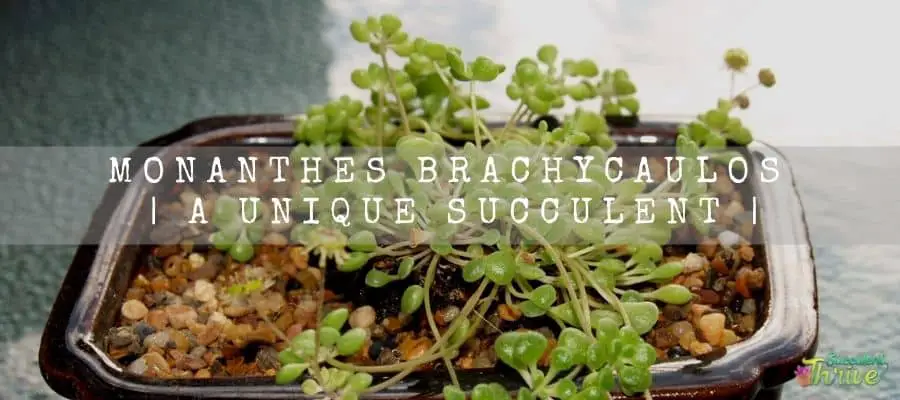Monanthes brachycaulos are spectacular succulents which you may come across in the succulent cactus world.
They are native plants to the Canary Island. Their habitat would be cliffs and rocky slopes.Their easy maintenance make them a great pick for anybody.
So, this article is a comprehensive guide on how you should look after them well.

How do I identify Monanthes brachycaulos?
They are perennial plants. Further they have a thickened rootstock. Monanthes brachycaulos plants consist of a roost stock which tend to take a bulb or cylindrical look.
They further carry small leaves, and they would form a rosette which would be about 3.5 cm in width. Those rosettes form solitary. Chances are that they would produce secondary rosettes as well.
The stem would be short and tend to look bulbous. They would elongate and grow. Monanthes brachycaulos stems would be 5-12 mm in diameter.
Their rosettes can be compact or loose. Moreover, they would be 7-35 (or 40) mm in diameter as well. Rosette would carry about 20-60 leaves.
Monanthes brachycaulos leaves would be 5-18 mm in length. The maximum width they achieve would be 3-5 mm. Further those leaves would be 1-2.5 mm in thickness as well.
They would either tend to take an ovate or oblongolate shape. Monanthes brachycaulos leaves may further carry a pointed shape too.
In addition to that they may carry short glandular hairs as well. Apart from that they would carry a purple stain at the base.
In addition to aforesaid, they would produce star shaped flowers. They would appear in clusters during spring.
Monanthes brachycaulos blossom with yellow flowers. Those flowers would be 3-4mm in diameter. They may further carry petals of 2.3 – 3.7 mm in length.
Besides those petals would be 0.5-0.7 mm in width as well. Monanthes pallens usually have similar features as the Monanthes brachycaulos plants.
Onelook care guide
| Botanical Name | Monanthes brachycaulos |
| Plant Type | Succulent |
| Mature Size | 3.5 cm in width |
| Sun Exposure | Bright indirect sunlight |
| Soil Type | Well-draining, sandy |
| Soil pH | Neutral |
| Bloom Time | Spring |
| Flower Color | Yellow |
| Hardiness Zones | USDA hardiness zones 9-11 |
| Native Area | Canary Island |
| Toxicity | Nontoxic |
| Average price | $ 6 |
How do you take care of Monanthes brachycaulos?
Light Requirement
Monanthes brachycaulos opt to grow in dappled sunlight. Never leave them exposed to direct sunlight. If you do so, it would make the plants scorched.
Temperature and humidity
In terms of the right temperature levels of the Monanthes brachycaulos plants a temperature range of 65-75 degrees Fahrenheit would suit them the best. Do not provide too warm temperature levels for them.
Is it cold hardy?
Monanthes brachycaulos are a little cold hardy.
Zone
You can grow Monanthes brachycaulos outdoors if you live in USDA hardiness zones 9-11.
Watering Requirement
Monanthes brachycaulos have very insignificant requirements when it comes to water. You can ascertain this fact when you consider the natural habitats they live in.
However, refrain from not watering them at all. Instead, water them moderately and allow their soil to dry between two watering sessions.
However, if you spot Monanthes brachycaulos soil that has become bone dry, you need to consider watering them. During winter , it is very unlikely that you will have to water them.
There will be adverse repercussions of over watering than under watering. As such be mindful when applying water for them and make sure that you do not provide them water in abundance.
Soil Requirement Type / pH
Monanthes brachycaulos would perform well if you provide a soil mix which has an excellent drainage.
Simply, they hate to be in soggy and waterlogged soil mixes. Additionally , your selected soil mix needs to be high porous as well.
Moreover, it has to be a proper aerating soil mix too. If you wish, you can simply go ahead with a commercially made succulents or a cactus soil mix.
In addition to that you could make a suitable soil mix by blending ½ commercial potting soil and ½ Sand component. You may also add pumice to this mix so that it will better the drainage of the soil mix.
Pot size Potting and Repotting
A pot which has ample drainage would be perfect for them. it will ensure that all excess water is not retained in the pot. Instead, they would move that out. You may conduct repotting once every two years.
Repotting is essential for the vigorous growth of the Monanthes brachycaulos as if you keep growing them in the same soil mix chances are that all nutrients would be depleted, and it is very likely that they would lack essential nutrients.
Once you repot them, Monanthes brachycaulos plants can gain nutrients freshly. Besides, when you conduct repotting, it will allow you to identify if the plant’s roots are growing healthy or not too. If there are any infected or damaged plant parts you can remove them.
Where to Plant
Choose a spot where they will not be exposed to direct sunlight as simply, they cannot stand it. Besides when you grow them in pots, you need to select a soil mix which has an excellent drainage and a good aeration.
Fertilizer and time of year
Consider applying liquid fertilizers for Monanthes brachycaulos once or twice a year. However before you do that, you should dilute it to ½ strength.
Flower
Monanthes brachycaulos blossom with flowers in yellow. You could spot them blossoming in spring. Those blooms would be star shaped too.
Dormancy
Monanthes brachycaulos will be dormant during winter.
Toxicity
Monanthes brachycaulos are nontoxic plants.
Common bugs and illnesses
Monanthes brachycaulos can resist pests’ attacks and diseases usually. However , chances are that mealybug and scales could invade them from time to time.
If you spot any bug, you need to wipe them off at that time itself. You could use a cotton swab dipped in alcohol to wipe them off. Alternatively, you may remove them with a toothpick as well.
In addition to that, Monanthes brachycaulos may suffer from yellow leaves too. In fact, the exposure for extreme sunlight is the root cause here.
In that circumstance what you could ideally do is to shift the plants to a shady place. Moreover, Monanthes brachycaulos could produce leaves whilst having considerable gaps also.
This literally means the plants are lacking sufficient sunlight.
Monanthes brachycaulos may form black patches due to rot. Rot could take place as a repercussion of over watering, and it is very unlikely that they will survive this particularly if it has spread on a severe level. Best would be to obtain the fresh cuttings and then use them for propagation.
Monanthes brachycaulos benefits
Monanthes brachycaulos would be great picks for windowsill plants. In addition to that we can use them as ground covers too.
Not only that, you could use them in low dish gardens along with other succulents. You can further use them for table decoration particularly if they are in full blossom.
Special Care tips
Monanthes brachycaulos can self-sustain and grow. Having said that, if you could spot any faded flowers, best would be to get rid of them so that it would make them look neat and pleasant. Moreover, if there are any leggy stems, you need to snip them also.
How to propagate Monanthes brachycaulos?
You can propagate the Monanthes brachycaulos by using the division method. Simply what you can do is , remove the Monanthes brachycaulos plant from the pot and cut it into several sections.
Ensure that the cut sections contain rosettes and roots. Next you can plant each of them in small pots. Ensure you are using a well-draining cactus potting mix during this process.
After that leave it in a place where they can absorb dappled sunlight.
If you use the cuttings, once you obtain them, leave them in a place where they can callus and dry. After that you can go ahead and plant them in a moist sandy soil mix. They will start to produce roots if you provide bright indirect sunlight.
Conclusion
Before concluding it would be so much fun growing Monanthes brachycaulos . if you could assure that you provide the growing necessities, they would simply flourish and reward you with fantastic plants and you will love them undoubtedly.
Read Next : Monanthes Polyphylla Care | A Super Cute Succulent |
